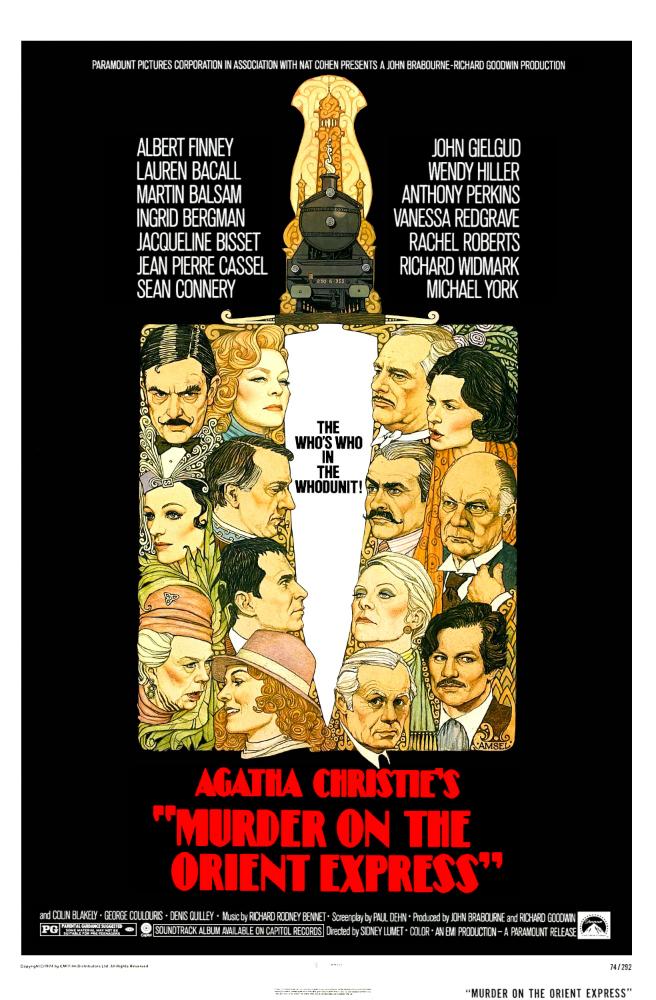📚 Unlock the World of AI and Humanity with These Two Free Books! 🚀
Dive into the thrilling realms of artificial intelligence and humanity with "The ECHO Conundrum" and "Awakening: Machines Dream of Being Human". These thought-provoking novels are FREE this week! Don't miss the chance to explore stories that challenge the boundaries of technology and what it means to be human.
Read More & Download
 Murder on the Orient Express (1974)
Murder on the Orient Express (1974)
The name Hercule Poirot is synonymous with brilliant deduction and intricate crime solving. One of Agatha Christie’s most celebrated cases, Murder on the Orient Express, brings Poirot face-to-face with a complex and morally ambiguous murder aboard the luxurious transcontinental train. This article delves into the enduring appeal of the 1974 film adaptation, analyzing the intricate plot, stellar cast, and lasting impact on the crime genre. We will examine the film through the lens of a criminal investigation, exploring the evidence, suspects, and Poirot’s masterful unraveling of the truth.
The Crime Scene: A Snowbound Train of Suspects
The film opens with the opulent Orient Express embarking on its journey, a microcosm of society filled with individuals from diverse backgrounds. When the train becomes stranded by a blizzard in the Yugoslavian mountains, the seemingly random assortment of passengers becomes trapped in a claustrophobic setting with a murderer among them. The victim, the ruthless businessman Samuel Ratchett (Richard Widmark), is found stabbed multiple times in his locked compartment. The initial chaos and isolation heighten the tension, creating a fertile ground for suspicion and intrigue. The confined space of the train becomes the crime scene, every compartment a potential hiding place for clues and secrets.
 Albert Finney as Hercule Poirot
Albert Finney as Hercule Poirot
Hercule Poirot: Master of Deduction on the Case
Enter Hercule Poirot (Albert Finney), the renowned Belgian detective with an unmatched eye for detail and an uncanny ability to decipher human nature. Faced with a multitude of suspects, each with their own secrets and potential motives, Poirot begins a meticulous investigation. He examines the physical evidence: the numerous stab wounds, a dropped handkerchief, a burnt piece of paper. But more importantly, he observes the passengers, studying their reactions, their alibis, and their subtle tells. He recognizes that the truth lies not only in the tangible clues but in the hidden depths of human psychology.
The Suspects: A Cast of Characters with Hidden Agendas
Christie’s genius lies in crafting a diverse and compelling cast of characters, each a potential suspect. The film boasts an ensemble cast of legendary actors, including Lauren Bacall, Ingrid Bergman, Sean Connery, and Vanessa Redgrave. Each character is meticulously developed, with their own backstories and connections to the victim, blurring the lines between guilt and innocence. From the glamorous Mrs. Hubbard (Lauren Bacall) to the mysterious Greta Ohlsson (Ingrid Bergman), everyone harbors secrets that could be linked to the murder. Poirot’s task is to sift through the layers of deception and uncover the truth hidden beneath the surface.
📚 Unlock the World of AI and Humanity with These Two Free Books! 🚀
Dive into the thrilling realms of artificial intelligence and humanity with "The ECHO Conundrum" and "Awakening: Machines Dream of Being Human". These thought-provoking novels are FREE this week! Don't miss the chance to explore stories that challenge the boundaries of technology and what it means to be human.
Read More & Download
Unraveling the Mystery: A Trail of Red Herrings and Revelation
As Poirot delves deeper into the investigation, he uncovers a web of interconnected relationships and hidden pasts. He encounters a trail of red herrings and conflicting testimonies, each designed to mislead him. The brilliance of the narrative lies in its ability to keep the audience guessing until the very end. The seemingly unrelated details that Poirot meticulously gathers gradually coalesce into a shocking revelation. The solution to the crime is not a simple whodunnit but a complex moral puzzle with far-reaching implications.
Justice and Morality: A Verdict Beyond the Courtroom
Murder on the Orient Express transcends the traditional crime thriller by exploring themes of justice, revenge, and the complexities of human morality. The final act reveals a truth that challenges conventional notions of right and wrong, forcing Poirot to confront his own beliefs about justice. The solution he presents is not a legal one, but a moral judgment that leaves the audience grappling with questions of guilt, responsibility, and the nature of punishment. This exploration of ethical dilemmas elevates the film beyond a simple mystery, transforming it into a thought-provoking examination of the human condition.
A Cinematic Masterpiece: Enduring Legacy and Cultural Impact
The 1974 adaptation of Murder on the Orient Express remains a cinematic masterpiece, praised for its faithful adaptation of the source material, its stellar cast, and its atmospheric setting. The film garnered critical acclaim, earning Ingrid Bergman an Academy Award for Best Supporting Actress. Its enduring popularity has led to numerous remakes and adaptations, solidifying its place in popular culture. The film’s success lies in its ability to capture the essence of Agatha Christie’s storytelling, weaving together suspense, intricate plotting, and unforgettable characters. Its exploration of justice and morality continues to resonate with audiences today, making it a timeless classic in the crime genre.

📚 Unlock the World of AI and Humanity with These Two Free Books! 🚀
Dive into the thrilling realms of artificial intelligence and humanity with "The ECHO Conundrum" and "Awakening: Machines Dream of Being Human". These thought-provoking novels are FREE this week! Don't miss the chance to explore stories that challenge the boundaries of technology and what it means to be human.
Read More & Download

